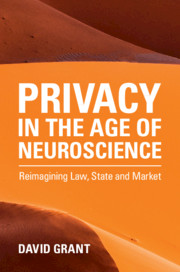
-
Select format
-
- Publisher:
- Cambridge University Press
- Publication date:
- April 2021
- April 2021
- ISBN:
- 9781108883931
- 9781108835428
- 9781108793360
- Dimensions:
- (229 x 152 mm)
- Weight & Pages:
- 0.61kg, 326 Pages
- Dimensions:
- (229 x 152 mm)
- Weight & Pages:
- 0.46kg, 326 Pages
You may already have access via personal or institutional login
Book description
Neuroscience has begun to intrude deeply into what it means to be human, an intrusion that offers profound benefits but will demolish our present understanding of privacy. In Privacy in the Age of Neuroscience, David Grant argues that we need to reconceptualize privacy in a manner that will allow us to reap the rewards of neuroscience while still protecting our privacy and, ultimately, our humanity. Grant delves into our relationship with technology, the latest in what he describes as a historical series of 'magnitudes', following Deity, the State and the Market, proposing the idea that, for this new magnitude (Technology), we must control rather than be subjected to it. In this provocative work, Grant unveils a radical account of privacy and an equally radical proposal to create the social infrastructure we need to support it.
Reviews
‘David Grant’s latest book is interdisciplinary work of the best kind, sweeping across the usual boundaries. He gives us a fresh, ambitious and potentially highly significant new concept of privacy in which neurotechnology is seen as a potential benefit rather than inevitably a threat. The promise of a new approach built around respect and responsibility is particularly attractive and timely.’
David Dixon - author of Law in Policing and From Prohibition to Regulation
‘This is a formidable work: closely argued, wide-ranging, well-informed and bold. It combines philosophical history and argument, close familiarity with recent advances in the neuroscience and the many planets of the cyberverse, with reflection on their human impacts and what might and should be done with and about them. From all this emerges an original and challenging theory of the nature and conditions of privacy in a modern hyper-technologized world. There is much to argue with here. It is all worth the argument.’
Martin Krygier - author of Philip Selznick: Ideals in the World
Contents
Metrics
Altmetric attention score
Full text views
Full text views help Loading metrics...
Loading metrics...
* Views captured on Cambridge Core between #date#. This data will be updated every 24 hours.
Usage data cannot currently be displayed.
Accessibility standard: Unknown
Why this information is here
This section outlines the accessibility features of this content - including support for screen readers, full keyboard navigation and high-contrast display options. This may not be relevant for you.
Accessibility Information
Accessibility compliance for the PDF of this book is currently unknown and may be updated in the future.


